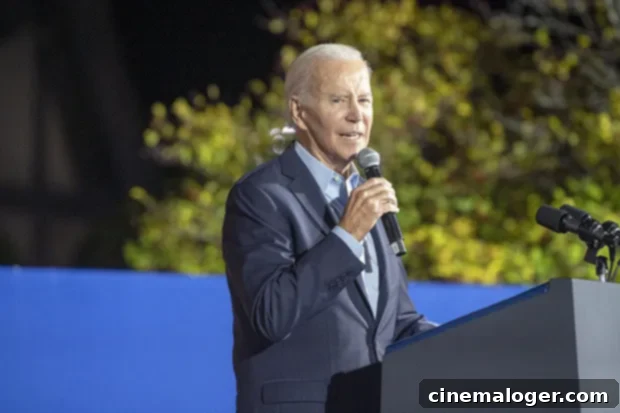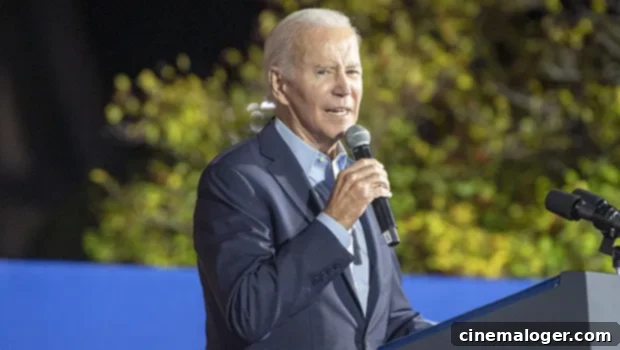President Joe Biden Officially Launches 2024 Re-election Campaign: A Call to Defend Freedom and Democracy
After months of anticipation and subtle hints, President Joe Biden has formally declared his intention to seek re-election for the U.S. presidency in 2024. The announcement, made on April 25, firmly establishes his bid for a second term, with Vice President Kamala Harris confirmed as his running mate. Biden, who is 80 years old, unveiled his campaign through a compelling three-minute video that resonated with his long-standing commitment to upholding fundamental American values, particularly the concept of freedom. In the video, he revisited a central theme from his successful 2020 campaign, stating, “When I ran for President four years ago, I said we are in the battle for the soul of America, and we still are.” This profound statement underscores the continued belief that the nation faces critical choices regarding its future direction. He further articulated the core question facing the electorate: “The question we are facing is whether in the years ahead we have more freedom or less freedom, more rights or fewer.” This framing sets the stage for a campaign focused on safeguarding individual liberties and democratic principles against perceived threats.
President Biden’s campaign message extends beyond a simple call to action; it is a reaffirmation of his deep conviction in the American people and their inherent goodness. “I know what I want the answer to be. This is not a time to be complacent. That’s why I’m running for reelection,” he emphasized in his announcement video. He expressed unwavering faith in the nation’s character, declaring, “I know America and I know we are good and decent people. I know we are still a country that believes in honesty and respect, and treating each other with dignity.” This sentiment highlights a desire to restore a sense of unity and mutual regard within the political landscape. Biden also touched upon the bedrock principles of American society, asserting, “We’re a nation where we give hate no safe harbor. We believe that everyone is equal and that everyone should be given a fair shot to succeed in this country.” By invoking these ideals, he aims to galvanize a broad coalition of voters who share his vision for a more inclusive and equitable society. He concluded his powerful address with a historical resonance, reminding Americans that “Every generation of Americans has faced a moment when they’ve had to defend democracy, stand up for our personal freedoms and stand up for our right to vote and our civil rights. This is ours. Let’s finish the job.” This plea positions the upcoming election as a pivotal moment in American history, requiring active participation to preserve democratic institutions and civil liberties.
The formal launch of President Biden’s re-election campaign followed a period of intense speculation and numerous indications that he would indeed seek a second term. While an incumbent president running for re-election is a customary practice in American politics, the exact timing of his announcement had been a subject of keen interest among political observers and the public alike. For several weeks leading up to April 25, Biden had repeatedly signaled his intentions, albeit without a definitive declaration. A notable instance occurred during an interview with Today on Monday, April 10, held during the White House Easter Egg Roll. When pressed on the matter, he unequivocally stated, “I plan on running.” However, he cautiously added, “We’re not prepared to announce it yet,” indicating that the official strategy and rollout were still being finalized. This gradual approach allowed his team to build anticipation and craft a message that would resonate effectively with potential voters and supporters across the nation. The deliberate pace also provided an opportunity to highlight key achievements of his first term before formally pivoting into campaign mode.

Further reinforcing the widespread expectation of his re-election bid, First Lady Jill Biden had previously offered her staunch support for her husband’s potential campaign. In a February interview with CNN, she made it clear that while the final decision rested with President Biden, she would be fully behind him. “It’s Joe’s decision, and we support whatever he wants to do. If he’s in, we’re there. If he wants to do something else, we’re there too,” she affirmed, showcasing a unified front within the first family. Her comments provided valuable insight into the internal discussions and the President’s mindset during the period of contemplation. She also confirmed his existing inclination, stating, “He said he intends to run. So, nothing’s been planned yet. I think he’s been so busy with being in Ukraine, handling some of the crises at home.” This statement not only hinted at his electoral intentions but also underscored the immense responsibilities of the presidency, particularly amidst global conflicts and domestic challenges. The First Lady’s remarks served to humanize the decision-making process, illustrating the balance between personal choice and the weighty demands of leading the nation.
During his first term as the 46th President of the United States, Joe Biden has navigated a complex array of domestic and international issues, making significant policy decisions and appointments that have shaped the nation’s trajectory. Beyond the pressing matter of the war in Ukraine, where he has rallied international support against Russian aggression and provided crucial aid, his administration has left an indelible mark on American society. A landmark achievement was the appointment of Justice Ketanji Brown Jackson to the Supreme Court. Her confirmation in April 2022 was historic, as she became the first Black woman to ever serve on the nation’s highest judicial body. This appointment not only diversified the court but also fulfilled a key campaign promise, reflecting Biden’s commitment to creating a government that truly represents the diversity of America.
Furthermore, President Biden has consistently articulated his dedication to safeguarding fundamental rights and liberties. Following the Supreme Court’s consequential decision in June 2022 to overturn Roe v. Wade, thereby eliminating the constitutional right to abortion, Biden emerged as a vocal proponent of reproductive rights. He has vowed to continue fighting to protect access to abortion, advocating for legislative measures and executive actions to mitigate the impact of the ruling. This stance positions him as a champion for women’s health and bodily autonomy. In a related vein, his administration also made significant strides in advancing LGBTQ+ rights. In December 2022, President Biden proudly signed the Respect for Marriage Act into law. This bipartisan legislation codified the rights to same-sex and interracial marriage into federal law, offering crucial protections and ensuring that these unions are recognized nationwide. This act represented a significant victory for civil rights advocates and demonstrated Biden’s commitment to equality for all Americans, solidifying his legacy on social issues during his initial term.
President Biden’s path to the White House in 2020 was a momentous one, marking a significant shift in American political leadership. He was elected as the 46th president after a highly contested election, successfully defeating incumbent President Donald Trump. Trump, who had served a single term following his unexpected victory in 2016, sought to secure a second term but ultimately lost to Biden. The 2020 election was notable not only for its outcome but also for the unprecedented challenges it faced, including the COVID-19 pandemic and widespread debate over election integrity. Despite Trump’s persistent and false claims that the election was “stolen” through widespread fraud – allegations that were repeatedly debunked by numerous courts and election officials – Biden peacefully took office in January 2021. His inauguration represented a return to traditional political norms and a commitment to democratic processes, themes that continue to resonate strongly in his 2024 re-election campaign.
As President Biden embarks on his re-election bid, he faces challenges not only from the opposing party but also from within his own. On the Democratic side, two notable figures have announced their campaigns, seeking to challenge the incumbent president for the party’s nomination. Environmental lawyer and activist Robert F. Kennedy Jr. has entered the race, appealing to a segment of voters with his anti-establishment stance and skepticism towards certain public health policies. Additionally, author and spiritual guru Marianne Williamson has once again thrown her hat into the ring, advocating for a more compassion-driven approach to politics and addressing systemic inequalities. While these challengers currently poll far behind Biden, their candidacies introduce an element of internal contestation for the Democratic nomination.
The Republican field, however, presents a more crowded and contentious landscape for the 2024 election. Former President Donald Trump has unequivocally announced another run for office, setting up a potential rematch with Biden. Trump’s campaign is unfolding amidst a backdrop of significant legal and political challenges. He is currently facing multiple ongoing investigations, including one from a Georgia grand jury regarding his alleged efforts to overturn the 2020 election results in that state. Furthermore, the Justice Department is investigating his involvement in the January 6 attack on the Capitol and his handling of classified documents taken to his Mar-A-Lago residence after leaving office. These federal investigations could lead to further indictments, adding unprecedented complexity to his presidential campaign. In a separate development, Trump will also face a criminal trial in New York, having been charged with 34 felony counts related to falsifying business documents, marking the first time a former U.S. president has faced criminal charges. These legal battles are central to the public perception of his candidacy and will undoubtedly play a significant role in the Republican primary and potentially the general election.
Beyond Trump, several other prominent Republicans have also launched campaigns for their party’s nomination, vying to present themselves as viable alternatives. Businessman Vivek Ramaswamy has emerged as a conservative voice, often advocating for a nationalist agenda and challenging what he terms “woke” ideologies. Former Congressman and Arkansas Governor Asa Hutchinson, known for his more traditional conservative platform and legal background, is also in the race, emphasizing experience and a return to principled governance. Additionally, former South Carolina Governor and U.S. Ambassador to the United Nations, Nikki Haley, has announced her candidacy, positioning herself as a fresh voice for the Republican party with a focus on generational change and pragmatic conservative policies. These candidates, along with others expected to join the race, are all competing to capture the attention of Republican voters and offer a compelling vision for the party’s future, as the nation looks towards a critical election that will once again define its direction.
